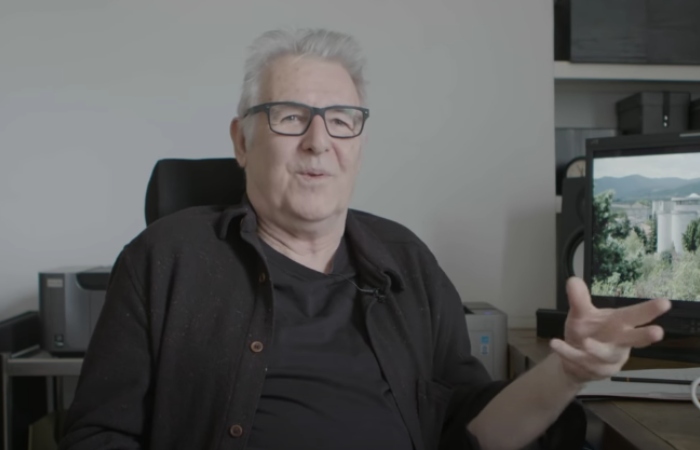“The Black Tower,” a short film of under 30 minutes that was directed (and mostly voiced) by the U.K.’s John Smith, who has a history of this sort of thing in his filmography, definitively answers close to nothing.
The basic premise is that a man, whose narration we hear for almost the entire duration, keeps seeing a black tower at increasing frequency, which eventually drives him over the metaphorical edge to the point that he shuts himself almost entirely inside, subsisting on an ice cream truck’s wares. He’s eventually hospitalized, and we’re simply left to imagine the physical state he’s in once the narrative turns there, as we’re shown a hospital — and the tower itself, time and again — but not the narrator.
The narration acknowledges the idea that the ever-present tower, about which the central subject even dreams, could simply be his mind crafting something from nothing — and then he eventually walks inside, which we find out moments later has correlated in the real world with him dying. And yet, it’s not as though the tower was simply his mental construct replacing a physical reality, as a woman whose voice we hear for the final few moments also begins seeing the tower.
Is it a malevolent entity? Does it house one? These things remain simply unexplained. In simultaneity, the audience experiences in great detail what it actually means to experience the psychological state of the central figure, as visual images — punctuated by the tower, sometimes from far away and sometimes extremely close-up — are erratic. They’re marked by abrupt cuts, which are sudden — and sometimes reversed in a sort of back-and-forth dance, where one moment something is there and the next it’s not, before it is again — to an extreme that the jarring feeling is extremely forward.
Visuals, which mostly seem to end up explained, aren’t always even directly connected in terms of either timing or content to what the narrator is saying. Sometimes, it’s just blocks of color, though we later see such expanses of color explained as either a countertop, a close-up on a glass of juice, or something else mundane.
It’s compelling to imagine the narrator-less experience of the nonetheless narrator-driven movie as emblematic of his mental state. In other words, the narrator is an important part of everything the audience sees, and yet, he goes without much basic elucidation. In short, it’s utter alienation in which even a sense of self has departed, when a feeling grips with such intensity that it’s as though the normal trains of thought have simply gone missing, without anyone necessarily even noticing. The narrator never sounds overly concerned about his personal well-being. He’s concerned with the tower — and he’s evidently willing, at least when pressed, to put himself in obvious physical danger (via the malnutrition) to accommodate.
The exact nature of the threat the tower might represent also goes conspicuously unexplained, instead relying on open-ended unease. In that feature of the story, one could also see a connection to some of the societal paranoia that sometimes grips politics, whether that’s in denial of the integrity of election results or conspiracy theory-driven ideas of a secret cabal of cannibalistic Satanists. In actual reality — whether meaning the objective qualities of this short or the real world in which we live — supporting substance isn’t present.
In sharing this frame of reference for paranoia in under 30 minutes, Smith — and Anna Hatt, who loans the other voice — crafted something that’s instantly memorable.
“The Black Tower” was originally released back in 1987.
Featured image: screenshot from here
You may also like
-
“Resia Schor: War and Peace” at Satchel Projects in New York City: Exhibition Review
-
“Alice Baber: Reverse Infinity” at New York City’s Berry Campbell: Exhibition Review
-
“taken through back entrances subtle fate matching matte thing soiled …” by Ser Serpas at the Whitney: Art Installation Review
-
“Houses and Hotels” from Donna Dennis at O’Flaherty’s in New York: Exhibition Review
-
“Practice Quotidian Ecstasy” from Gene Beery at NYC’s Derosia: Exhibition Review
